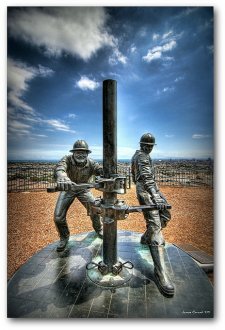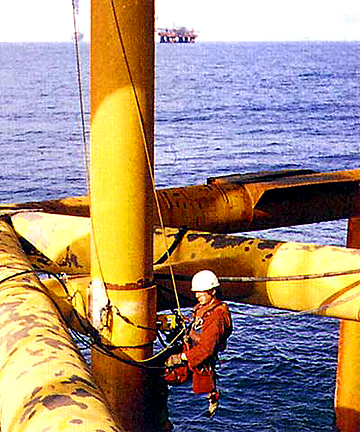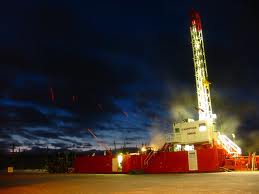Do you have an interest in a rig welder job position? A rig welder is in demand at offshore drilling locations. Of course, if you do not have experience then you’ll probably be either a rig welder’s assistant or a roustabout.

Hopefully, you’ve taken some technical training – if you have your rig welder certificate, then you’ll be able to apprentice. Graduating from a technical school is far more useful (for job acquisition) than having a high school degree.
If you are in a technical school, it’s best to finish that prior to seeking out work. This is particularly true in the case of working offshore, where there are enough challenges already. Being at sea (offshore) is a rather hostile environment, without adding “lack of knowledge” to the mix.
Other Requirements: Looking Ahead
When looking to get hired, you want to have any advantage. If you acquire you First Aid Certification, and do your HUET training it’ll help. It shows the boss that you cared enough to get that handled, so you can be in a position to work right away.
Many people may feel it is an easy process to get a job, simply because they hear that a certain type of job is in demand and needs workers – but this can be wrong-headed.
Working on an offshore rig is demanding, not only due to the long hours – it is also being in a “hurricane zone” that is challenging. So you’ll want to check with your doctor, to verify that you’re in very good health before you apply.
Preparing for an Interview
Do Some Research on The Company
You’d be well advised to look into the company, and find out precisely what they do – and thereby, exactly how you can help them. That is, what are you great at? What do you bring to the table? Look up the history of the company and the financials. What are their past accomplishments, and WHAT do they hope to achieve in the near term? How can you help them achieve it? Do they have any expansion plans? By knowing specifics about the oil company, you’ll be in a better position to make a good impression.
Working in Far-Flung Areas of the World – Offshore Oil Rig jobs
You may work on a rig off the coast of Norway, or you may be in the Gulf of Mexico. It is probably a good idea to make sure all your affairs are in order – this is not to say that anything bad is going to happen,but if you have a family you need to be prepared.
Another thing to think about is getting any necessary SHOTS – you may need to have immunizations or vaccines.

In terms of salary, a rig welder on an offshore rig will make approximately 61,000 dollars to 66,000 dollars annually. Generally, you’ll work two to three weeks and then have 2-3 weeks off.
If you land a job as a roustabout, you can likely make close to $50k a year. As a roustabout, you’ll be a man of many trades. You may have to build on site – and do quite a lot of maintenance on equipment. So be prepared; it’s very “hands on” type of work.
You can gain some significant experience by being a roustabout – and then work your way up to a rig welder position. The main thing is to make yourself a valuable employee.
Extra Factors: Food for Thought as an Oil Rig Worker
As you’ll be working far from home in a very physical and dangerous job, the helicopter medic is an important person in your life. In the event of an emergency, you’ll depend heavily on medical personnel assigned to your rig zone. Thus, I suggest you do nothing whatever to offend this person.

There have been a lot of positive developments; today there is new technology, and better healthcare for offshore oil workers .. I have an excellent article on today’s medic – who is more highly trained than the “glorified first aid practitioners” of old (SEE Resources at end of Article)
Note: Another individual who is important to your well-being is the cook. After all, to work long hours you need LOTS of sustenance. So think about that (lol) before you crack wise about the fare.
Final Notes: Challenges with Offshore Work
Work offshore comes with challenges. You might guess that there is a lot harsh weather – and if you are in the Gulf and word comes, there will be a lot of STEPS involved to prepare the oil rig for the storm. It takes time to follow through with the steps.
Normally, it can take from 36 to 48 hours to complete all the evacuation steps. The drilling has to cease, and the hole must of course be sealed. Pipes need to be pulled. Personnel are chaining down heavy equipment that cannot be easily offloaded.
Because the Gulf attracts many tropical storms, this will become a regular routine for you if you choose to work at sea. It is a harsher environment, and I want to let you know it.
If you can, I strongly suggest you get the HUET certificate (helicopter underwater escape training) prior to applying.
There are more survival related training courses and certificates – such as for Firefighting. There’s BOSIET (Basic Offshore Safety Induction and Emergency Training), which is for working on an installation in the UK sector .
It is a good idea to seek some information online about the various courses and certificates – so you will be aware, and be prepared for your interview.
Look in forums online, and check out articles and videos. Analyze both past and current job positions
Tip: Remember that ultimately scoring a rig welder or other specialized position in the oil field entails getting the proper training, applying with the right contractors, and staying safe.






